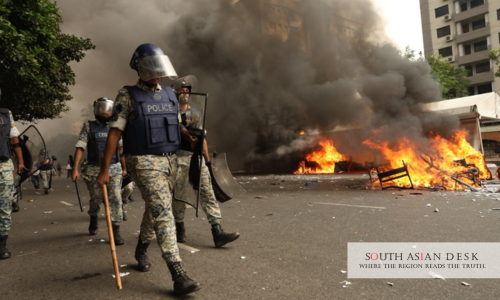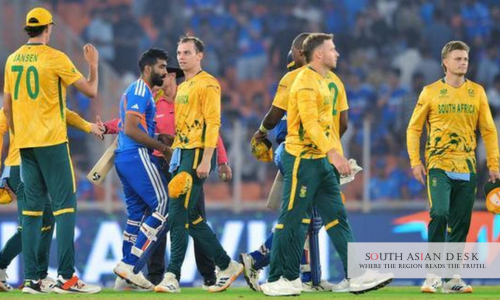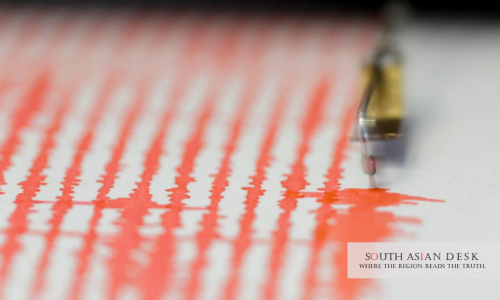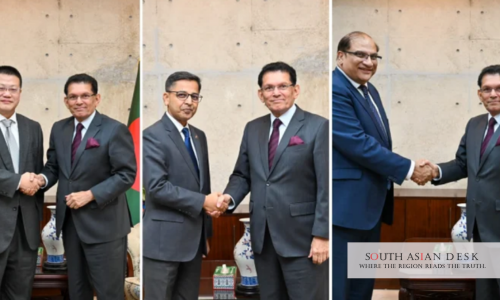Dhaka Metropolitan Police dispersed more than 100 July charter protesters from Bangladesh parliament premises on Friday afternoon. The action followed a sit-in demanding recognition and charter amendments. The incident occurred at 1:35 PM during preparations for the 4 PM signing ceremony of the July National Charter. Chief Adviser Muhammad Yunus urged national unity for the event. Violence ensued on Manik Mia Avenue, where protesters vandalised vehicles.
The clashes highlight tensions over the July Uprising’s legacy, which toppled the previous government in 2024. Over 100 demonstrators, including injured fighters and martyrs’ families, breached Gate No 12 to occupy the South Plaza. Police used batons, sound grenades, and tear gas shells to clear the area. At least 20 people sustained injuries, according to eyewitness reports. Protesters set fire to wooden furniture to counter tear gas effects.
This story matters across South Asia as Bangladesh navigates post-uprising reforms. The July National Charter aims to embed uprising principles into governance, influencing regional stability amid shared concerns over youth-led movements and minority protections. Similar protests in India and Pakistan underscore the charter’s potential to model transitional justice.
Escalating Tensions at Parliament
The July Warriors protest parliament Bangladesh began on Thursday night. Over 100 people gathered outside Gate No 12 of the Jatiya Sangsad complex. They chanted slogans against delays in recognising their sacrifices. By Friday morning, the group climbed the gate and entered the premises. They occupied guest chairs near the stage set for the charter signing.
Police arrived shortly after 1 PM. Officers charged with batons to remove the demonstrators. A group tried to return to the stage but faced further dispersal. Outside, young men with sticks threw brick chips at security forces. Protesters expressed anger, claiming one faction fled due to their efforts while another seized power.
The unrest spread to Manik Mia Avenue. Demonstrators vandalised a police car and bus. They lit fires using street furniture. Military personnel reinforced positions inside the parliament wall. Calm returned by 3 PM, but debris littered the area.
Demands Fuel July Warriors Protest
The July Warriors seek three core demands. First, official recognition as “July injured heroes” for those wounded in the uprising. Second, legal protections and social security, including lifelong medical support. Third, incorporation of these provisions into the July National Charter.
The charter, drafted by the National Consensus Commission, outlines reforms from the 2024 uprising. It covers electoral changes, minority rights, and anti-corruption measures. Protesters argue the document overlooks their contributions. National Consensus Commission Vice-Chairman Professor Ali Riaz intervened to calm the crowd.
In a press release, the Chief Adviser’s Press Wing confirmed the charter’s finalisation. “The draft will be presented before the nation in the presence of all parties involved in last year’s July demonstrations,” it stated. The release urged swift implementation but did not address protester demands directly.
The Bangladesh Police maintain order during such events. Their human rights portal emphasises equitable access to justice. No specific statement on the clashes appeared on official channels by 4:35 PM.
Government Response and Charter Signing
The interim government prioritises the July Charter as a cornerstone of reform. Chief Adviser Muhammad Yunus called on citizens to “tune in and be part of this historic moment” at 4 PM. The ceremony proceeded despite the morning violence.
A key development emerged post-clashes. The National Consensus Commission amended the fifth clause of the charter. This revision reflects July Warriors’ inputs after consultations with political parties. Professor Ali Riaz announced the change at the signing. “Urgent amendments have been made to honour the demands of the July Warriors,” he said.
The amendment ensures recognition of uprising participants. It mandates social security and legal safeguards. Political parties, including BNP and Jamaat, reviewed the updates. The press release from the commission confirmed the clause’s alignment with protester calls.
Dhaka Metropolitan Police deployed additional forces. Deputy Commissioner Masud Alam noted chaos from rival groups in prior incidents. “A group identifying as July Warriors occupied the area, leading to fighting,” he said in an earlier statement on similar clashes.
The government views the charter as unifying. It draws from the uprising that ousted Sheikh Hasina on August 5, 2024. Over 300 lives were lost in those events, per official data. The document proposes a 10% parliamentary quota for minorities and strict laws against attacks.
Background on July Revolution
The July Revolution reshaped Bangladesh politics. Students and citizens protested quota systems and governance failures. Clashes with security forces escalated in mid-July 2024. Protests spread nationwide, forcing Hasina’s resignation.
Post-revolution, an interim government under Yunus formed the National Consensus Commission. It consulted stakeholders for the charter. Early drafts faced objections from parties like BNP and Islami Andolon. Delays sparked sit-ins, including a 32-hour blockade at Shahbagh in August.
Rival July Warriors groups clashed then, injuring dozens. Police dispersed them using minimal force, per Ramna Division reports. The interim setup finalised the draft by August 5, 2025, for national presentation.
The uprising’s toll included 1,400 arrests and widespread displacement. Government data from the Ministry of Home Affairs tracks rehabilitation efforts. The charter integrates these lessons, focusing on youth empowerment and rule of law.
Clashes in Broader Context
Bangladesh July national charter clashes echo regional unrest. In Pakistan, student protests demand similar reforms. India’s quota agitations parallel the 2024 triggers. South Asia watches as Bangladesh balances commemoration with stability.
Protesters burned effigies near the parliament. They accused the government of sidelining heroes. Security forces used three rounds of sound grenades. Vandalism damaged public property worth BDT 2 million, per initial estimates.
The National Consensus Commission mediated briefly. Professor Riaz’s intervention de-escalated tensions. Yet, underlying frustrations persist over implementation timelines.
What’s Next for July Charter Protesters
The signing marks a milestone, but Bangladesh police disperse July charter protesters signals ongoing challenges. The government pledges clause enforcement within 90 days. July Warriors plan follow-up rallies if demands lag.
Political dialogues continue. The commission schedules stakeholder meetings next week. Yunus’s administration eyes elections by mid-2026. Recognition for warriors could foster unity, or fuel division if unmet.
As reforms unfold, vigilance ensures the charter’s spirit endures. Protesters vow peaceful advocacy, urging inclusion in constitutional amendments.
Published in SouthAsianDesk, October 17th, 2025
Follow SouthAsianDesk on X, Instagram, and Facebook for insights on business and current affairs from across South Asia.






